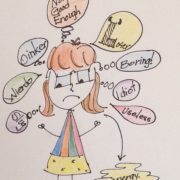I work with people who just can’t stop worrying. They tell me about the awful panic attacks they have, which can feel devastating. Many show up in the emergency room, only to be told there is nothing wrong. Being stuck in the panic loop stinks, but you can learn how to manage it so it doesn’t take over your life. The body doesn’t lie; when it shouts, you have to listen—but maybe in a whole new way.
Posts
I’m so sorry you’re in the midst of a bad depression episode, but here are some possibilities for you. I want you to know there is a future.
Worry as a way to problem solve feels useful. Big hint: It isn’t. How to stop worrying becomes more doable when you think of it as spam. The worry thoughts pop instantly into your inbox, aka brain, with catchy titles and tantalizing “solutions.” Of course you supply those solutions, which allows a new email to pop up! Yay! Another problem to “solve” and you’re off to the races. It actually could be conceived as looking like a zig zag pattern in your mind. You go up with a problem, down with a “solution” so it feels like you are accomplishing something with the “action” of worry. And that zig zag can be infinite.
Word. This is the number one anxiety related sleep issue I hear about: “I wake up and can’t get back to sleep.” That is closely followed by: “I can’t get my monkey mind to stop at night when I am trying to get to sleep.” I am going to help you with both issues. It’s up to you to actually implement the help. Horses, water, drink…well you know the drill.
First we are going to get the blah, blah, blah, sleep hygiene talk out of the way. You have heard it all before, BECAUSE IT’S IMPORTANT, duh. If you can’t get these principles under wraps, you may as well stop here, even if I am going to give you some mostly secret knowledge later on.
First, why do we blush? The feeling accompanied by blushing is an exquisite sensitivity to the feeling of embarrassment. Embarrassment is often tied to shame. Blushing is an automatic, uncontrollable response to these feelings. It happens in humans because our facial veins react to this adrenaline. So when the limbic system is triggered, the blood rushes to the face causing the redness to appear. There is a lot of basic (scientific) info on this reaction here, here and here if you are interested.
But what you really want to know is how to control blushing. Right?
It’s pretty standard knowledge that you go to therapy to change something. But changing a way of thinking or a behavior we don’t like is just not that easy, is it? And it is especially difficult to change our reactions to other’s mayhem. If it was we’d all do it and be on our merry way. Let me share three signs you need therapy.
I can’t stand feeling this way! My heart is racing. My stomach is churning. I’m sweating like a racehorse. I can’t stop! What if it never stops? Your thoughts are meanwhile trying to keep up with your racing heart at 160 beats a minute and you are well on your way to a panic attack.
This is what is happening in the more extreme moments of panic. And the first thing you must learn to do is neutralize these BIG feelings, and deflate the strength of those thoughts. It is the first step in quieting the limbic system, your central nervous system, so that you can stop a panic attack before it becomes full blown.
You can call me honey—if you’re my husband. What is this about? I recently shared an article from Next Avenue on the harm it does to older persons when they are called honey or sweetie. These terms contribute to ageism according to the article. Boy did I get some pushback on my stance of avoiding those words! My readers contributed great insight on the topic, but many feel it is Southern custom, and that I should just lighten up 😉
Yes, loneliness is a bummer topic, and one of those that people respond to with the thought “NMP” (Not My Problem) and then change the channel. Yet it affects 25% of us in the USA, chronically. With the chronic nature of it come a host of health issues that can increase the chance of early death by up to 26%, according to the guru on the topic, John Cacioppo, a professor and researcher on the issue for more than twenty years. Why is this so?
Are you one? A super sensitive ruminator? A person who thinks deeply about things, maybe sometimes too much? Or perhaps you veer into the scarier territory of unwanted intrusive thoughts. These little torturers will keep you stuck for sure. The most ineffective action you can take is trying not to have your thoughts. My mantra to you is “Change your relationship with your thoughts and your beliefs about them.”
PAGE RUTLEDGE, LCSW, CHt | Couples Counseling
Tel: 910-777-7243
Offices at:
5006 Randall Parkway (close to UNCW)
Wilmington, NC 28403
Free parking at office


 Page Rutledge, LCSW
Page Rutledge, LCSW






